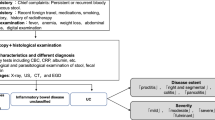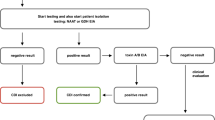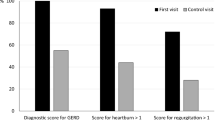Abstract
Background
Recent evidence suggests a role for enteric bacteria in the development of symptoms in subjects with irritable bowel syndrome (IBS). The concept was initially based on the common finding of an abnormal lactulose breath test to suggest the presence of small intestinal bacterial overgrowth (SIBO). Despite successful antibiotic studies based on these findings, the premise of bacterial overgrowth was met with skepticism due to the perceived inaccuracies of breath testing in humans. In this study, we conduct a systematic review and meta-analysis of the studies using breath testing in IBS subjects with comparison to healthy controls.
Methods
A literature search was conducted to identify studies in which breath testing was conducted in subjects with IBS. Once abstract titles were identified, studies that examined breath testing in a case–control fashion were identified for paper review. After exclusion criteria were applied, the remaining papers were examined using meta-analysis, among which the prevalence of an abnormal breath test in IBS subjects was compared. Further analysis was conducted among studies with appropriate age- and sex-matched controls.
Results
Eleven studies met criteria for inclusion in the meta-analysis. Although heterogeneity was identified among studies on the basis of substrate used, lactulose was the most common substrate. In pooling the 11 studies, breath testing was more often abnormal among IBS subjects than health controls (OR = 4.46, 95% CI = 1.69–11.80). This was further evident in more appropriately designed age- and sex-matched studies (OR = 9.64, 95% CI = 4.26–21.82). The overall sensitivity and specificity for breath testing in separating IBS from healthy controls was 43.6 and 83.6%.
Conclusions
This study demonstrates that the breath test findings in IBS appear to be valid. While this meta-analysis does not suggest that the breath test findings imply SIBO, the abnormal fermentation timing and dynamics of the breath test findings support a role for abnormal intestinal bacterial distribution in IBS.




Similar content being viewed by others
References
Drossman DA, senior ed; Corazziari E, Talley NJ, Thompson WG, Whitehead WE, The Rome II Multinational Working Teams, eds. Rome II: The Functional Gastrointestinal Disorders. 2nd edn. McLean, Va: Degnon Associates; 2000.
Whitehead WE, Burnett CK, Cook EW III, et al. Impact of irritable bowel syndrome on quality of life. Dig Dis Sci. 1996;41:2248–2253.
Gralnek IM, Hays RD, Kilbourne A, et al. The impact of irritable bowel syndrome on health-related quality of life. Gastroenterology. 2000;11:654–660.
Hungin AP, Whorwell PJ, Tack J, et al. The prevalence, patterns and impact of irritable bowel syndrome: an international survey of 40,000 subjects. Ailment Pharmacol Ther. 2003;17:643–650.
Wilson S, Roberts L, Roalfe A, et al. Prevalence of irritable bowel syndrome: a community survey. Br J Gen Pract. 2004;54:495–502.
Maxion-Bergemann S, Thielecke F, Abel F, et al. Costs of irritable bowel syndrome in the UK and US. Pharmacoeconomics. 2006;24:21–37.
Pimentel M, Chow EJ, Lin HC. Normalization of lactulose breath testing correlates with symptom improvement in irritable bowel syndrome. A double-blind, randomized, placebo-controlled study. Am J Gastroenterol. 2003;98:412–419.
Pimentel M, Park S, Mirocha J, et al. The effect of a nonabsorbed oral antibiotic (rifaximin) on the symptoms of the irritable bowel syndrome. Ann Intern Med. 2006;145(8):557–563.
Sharara AI, Aoun E, Abdul-Baki H, et al. A randomized double-blind placebo-controlled trial of rifaximin in patients with abdominal bloating and flatulence. Am J Gastroenterol. 2006;101:326–333.
Pimentel M, Chow EJ, Lin HC. Eradication of small intestinal bacterial overgrowth reduces symptoms of irritable bowel syndrome. Am J Gastroenterol. 2000;95:3503–3506.
Posserud I, Stotzer PO, Bjornsson ES, et al. Small intestinal bacterial overgrowth in patients with irritable bowel syndrome. Gut. 2007;56:802–808.
Simren M, Stotzer PO. Use and abuse of hydrogen breath tests. Gut. 2006;55:297–303.
Vanner S. The small intestinal bacterial overgrowth, irritable bowel syndrome hypothesis: implications for treatment. Gut. 2008;57:1315–1321.
Khoshini R, Dai SC, Lezcano S, et al. A systematic review of diagnostic tests for small intestinal bacterial overgrowth. Dig Dis Sci. 2008;53:1443–1454.
Bossuyt PM, Reitsma JB, Bruns DE, et al. The STARD statement for reporting studies of diagnostic accuracy: explanation and elaboration. Clin Chem. 2003;49:7–18.
Walters B, Vanner SJ. Detection of bacterial overgrowth in IBS using the lactulose H2 breath test: comparison with 14C-D-xylose and healthy controls. Am J Gastroenterol. 2005;100:1566–1570.
DerSimonian R, Laird N. Meta-analysis in clinical trials. Control Clin Trials. 1986;7:177–188.
Sweeting MJ, Sutton AJ, Lambert PC. What to add to nothing? Use and avoidance of continuity corrections in meta-analysis of sparse data. Statist Med. 2004;23:1351–1375.
Higgens JPT, Thompson SG. Controlling the risk of spurious findings from meta-regression. Stat Med. 2004;23:1663–1682.
Harbord RM, Egger M, Sterne JAC. A modified test for small-study effects in meta-analysis of controlled clinical trials with binary endpoints. Stat Med. 2006;25:3443–3457.
Galatola G, Grosso M, Barlotta A, et al. Diagnosis of bacterial contamination of the small intestine using the 1 g [14C] xylose breath test in various gastrointestinal diseases. Minerva Gastroenterol Dietol. 1991;37:169–175.
Pimentel M, Wallace D, Hallegua D, et al. A link between irritable bowel syndrome and fibromyalgia may be related to findings on lactulose breath testing. Ann Rheum Dis. 2004;63:450–452.
Lupascu A, Gabrielli M, Lauritano EC, et al. Hydrogen glucose breath test to detect small intestinal bacterial overgrowth: a prevalence case-control study in irritable bowel syndrome. Aliment Pharmacol Ther. 2005;22:1157–1160.
Bratten JR, Spanier J, Jones MP. Lactulose breath testing does not discriminate patients with irritable bowel syndrome from healthy controls. Am J Gastroenterol. 2008;103:958–963.
Grover M, Kanazawa M, Palsson OS, et al. Small intestinal bacterial overgrowth in irritable bowel syndrome: association with colon motility, bowel symptoms, and psychological distress. Neurogastroenterol Motil. 2008;20:998–1008.
Rana SV, Sinha SK, Sikander A, et al. Study of small intestinal bacterial overgrowth in North Indian patients with irritable bowel syndrome: a case control study. Trop Gastroenterol. 2008;29:23–25.
Skoog SM, Bharucha AE, Zinsmeister AR. Comparison of breath testing with fructose and high fructose corn syrups in health and IBS. Neurogastroenterol Motil. 2008;20:505–511.
Parodi A, Dulbecco P, Savarino E, et al. Positive glucose breath testing is more prevalent in patients with IBS-like symptoms compared with controls of similar age and gender distribution. J Clin Gastroenterol. 2009;43:962–966.
Scarpellini E, Giorgio V, Gabrielli M, et al. Prevalence of small intestinal bacterial overgrowth in children with irritable bowel syndrome: a case-control study. J Pediatr. 2009;155:416–420.
Collins BS, Lin HC. Chronic abdominal pain in children is associated with high prevalence of abnormal microbial fermentation. Dig Dis Sci. 2010;55:124–130.
Spiegel BM, Chey WD, Chang L. Bacterial overgrowth and irritable bowel syndrome: unifying hypothesis or a spurious consequence of proton pump inhibitors? Am J Gastroenterol. 2008;103:2972–2976.
Law D, Pimentel M. Proton pump inhibitor therapy does not affect hydrogen production on lactulose breath test in subjects with IBS. Dig Dis Sci (in press) (Epub ahead of print).
Ford AC, Spiegel BM, Talley NJ, et al. Small intestinal bacterial overgrowth in irritable bowel syndrome: systematic review and meta-analysis. Clin Gastroenterol Hepatol. 2009;7:1279–1286.
Gasbarrini A, Corazza GR, Gasbarrini G, et al. Methodology and indications of H2-breath testing in gastrointestinal diseases: the Rome Consensus Conference. Aliment Pharm Ther. 2009;29:S1–S49.
Bond JH, Engel RR, Levitt MD. Factors influencing pulmonary methane excretion in man. An indirect method of studying the in situ metabolism of the methane-producing colonic bacteria. J Exp Med. 1971;133:572–588.
Pimentel M, Mayer AG, Park S, et al. Methane production during lactulose breath test is associated with gastrointestinal disease presentation. Dig Dis Sci. 2003;48:86–92.
Hwang L, Low K, Khoshini R, et al. Evaluating breath methane as a diagnostic test for constipation predominant IBS. Dig Dis Sci. 2010;55:398–403.
Pimentel M, Chow EJ, Park S, Kong Y. Neomycin improves constipation in IBS in a fashion that is dependent on the presence of methane gas: sub-analysis of a double-blind randomized controlled study. Dig Dis Sci. 2006;51:1297–1301.
Acknowledgments
This study was supported in part by the Beatrice and Samuel A. Seaver Foundation.
Conflict of interest
Dr. Pimentel is a consultant for Salix Pharmaceuticals and has grant funding from Prometheus Diagnostics and Salix Pharmaceuticals. Cedars-Sinai has a licensing agreement with Salix Pharmaceuticals.
Author information
Authors and Affiliations
Corresponding author
Rights and permissions
About this article
Cite this article
Shah, E.D., Basseri, R.J., Chong, K. et al. Abnormal Breath Testing in IBS: A Meta-Analysis. Dig Dis Sci 55, 2441–2449 (2010). https://doi.org/10.1007/s10620-010-1276-4
Received:
Accepted:
Published:
Issue Date:
DOI: https://doi.org/10.1007/s10620-010-1276-4




